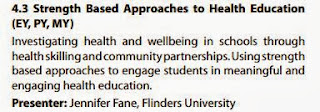AARE Annual National Conference 2013 - Adelaide, Australia
Photo from the AARE 2013 Annual International Conference http://aare2013.com.au
The 2013 Australian Association for Research in Education (AARE) Annual International Conference kicks off today with pre-conference workshops and the President's reception. The conference is being held in Adelaide this year, and there will be a strong attendance from the School of Education at Flinders, including a symposium involving myself and four other colleagues chaired by our Deputy Dean Kay Whitehead.
Our symposium is entitled Repositioning student teachers in teacher education, and focuses on some of the teacher education research happening at Flinders in the area of Arts integration, Health education and equity.
The research project I am working on is a collaborative project between myself and fellow lecturer in Health Education Grant Banfield, alongside two colleagues from the Student Learning Centre at Flinders, Kathy Brady and Samantha Schulz. The following abstract is a part of our research that I will be presenting at AARE
The occupation of teaching is
transformative intellectual work. At Flinders University we recognise education
as a public good and teachers’ fundamental roles as citizens in constructing
democratic societies. To these ends, we understand that student teachers need
to participate in a wide range of reflective and reflexive practices that
foster their creativity, stimulate personal growth, contribute to current
knowledge and enhance their understanding of the world and their place in it.
Sponsored by Flinders Research in Early Childhood Education and the Social
Inquiry Network, this symposium focuses on the ways in which we are
repositioning student teachers in the learning process in three topics from our
teacher education program. Jennifer Fane and Grant Banfield
problematize first year primary and secondary student teachers’ understandings
of health and introduce them to the practice of thinking socially about health
and Health Education. Susan Krieg, Jess Jovanovic and Helen Bernstone
work with local Adelaide artists and student teachers to reconceptualise the
Arts in early childhood education. Amy Hamilton’s research documents an innovative partnership
with an Australian Zoo to prepare student teachers for teaching and integrating
the arts through the use of 'big ideas' of Cross Curricular Priorities, and
General Capabilities (The Australian Curriculum) in primary schools. All of
these presentations position student teachers as active learners and citizens,
challenge them to engage reflexively with their studies, and work towards a
more equitable education in a rapidly changing world.
The research project I am working on is a collaborative project between myself and fellow lecturer in Health Education Grant Banfield, alongside two colleagues from the Student Learning Centre at Flinders, Kathy Brady and Samantha Schulz. The following abstract is a part of our research that I will be presenting at AARE
Pre service teacher beliefs and knowledge of
health are largely constructed by widely held societal views of health as the
unproblematic outcome of ‘healthy’ lifestyle decisions and the responsibility
of individuals. While Health Education literature is clear about societal views
of health, these views run counter to sociological and epidemiological
evidence. This individualistic view of health, which dominate Western liberal
societies like Australia, is in direct contrast to a social view of Health
which seeks to offer a deeper understanding of the power-relational aspects of
health at play in Australian and global society. This mandatory first year
Health Education topic introduces students to the idea and practice of thinking
socially about health, aiming to develop a sociological imagination for
students who, generally, intend to be Health and Physical Education teachers in
primary or secondary schools. This research seeks to investigate the extent to
which a first year undergraduate teaching topic is successful in shifting
student thinking from an individualistic to social view of health, thus
supporting their future Health Education practices. The research uses the
analysis of student written work and individual student interviews to identify
pedagogical and organizational features of the topic that contribute to student
academic engagement, and the growth of learner understanding of the social
nature of health. Discussed are findings from the data which seek to evaluate
the success of the topic in shifting student thinking; and considerations for
effective practices in pre service teacher Health Education.









